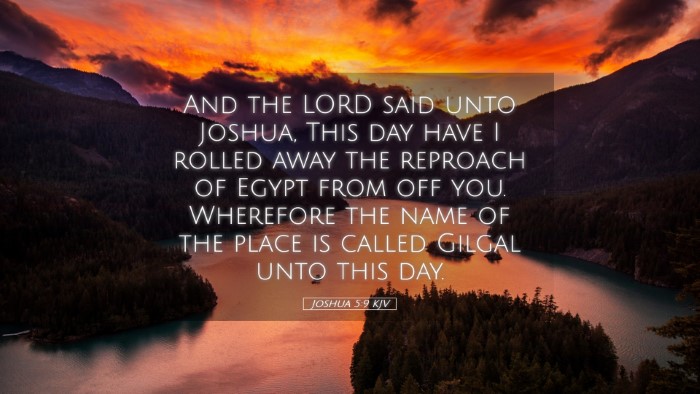Old Testament
Genesis Exodus Leviticus Numbers Deuteronomy Joshua Judges Ruth 1 Samuel 2 Samuel 1 Kings 2 Kings 1 Chronicles 2 Chronicles Ezra Nehemiah Esther Job Psalms Proverbs Ecclesiastes Song of Solomon Isaiah Jeremiah Lamentations Ezekiel Daniel Hosea Joel Amos Obadiah Jonah Micah Nahum Habakkuk Zephaniah Haggai Zechariah MalachiJoshua 5:9
Joshua 5:9 KJV
And the LORD said unto Joshua, This day have I rolled away the reproach of Egypt from off you. Wherefore the name of the place is called Gilgal unto this day.
Joshua 5:9 Bible Commentary
Bible Commentary on Joshua 5:9
Bible Verse: "Then the LORD said to Joshua, 'Today I have rolled away the reproach of Egypt from you.' So the place is called Gilgal to this day." (Joshua 5:9 ESV)
This verse symbolizes a pivotal moment in Israel's journey, representing both a physical and spiritual transition for the Israelites as they enter the Promised Land. The combination of insights from renowned public domain commentaries offers a multifaceted understanding of the significance of this verse.
Context of Joshua 5:9
Understanding the broader context of this passage helps delineate its relevance. The Israelites have just crossed the Jordan River, marking the end of their wilderness wanderings. This transition signified a new beginning as they now faced the conquest of Canaan, a land promised to them by God.
Theological Insights
Matthew Henry emphasizes the significance of God’s declaration in this verse. He states that the phrase "rolled away the reproach of Egypt" indicates a removal of shame and a new identity for the Israelites. The reproach of Egypt represented not only their physical bondage but also a spiritual and moral deficiency. By rolling away this reproach, God affirms their release and acceptance as His chosen people.
Albert Barnes expands on the idea of reproach, highlighting that the Israelites carried the stigma of slavery and disobedience. Their past experiences in Egypt, marked by oppression and idolatry, served as a constant reminder of their former state. This divine act of rolling away the reproach signals a complete break from their past failures and God's redemptive power in their lives.
Adam Clarke elucidates further the implications of Gilgal, the site where this event occurs. The name "Gilgal" literally means "rolling," which reflects the truth that God has rolled away their shame. Clarke notes that this geographical location becomes symbolic of their new life in the land of promise. God's actions at Gilgal mark the beginning of a new chapter, both geographically and spiritually.
Significance of Gilgal
Gilgal serves as a central theological motif throughout the biblical narrative. It represents the initial resting place where the Israelites could reflect on their past, present, and future. This site becomes a focal point for subsequent events in the conquest of Canaan and symbolizes a transformation of the people. Below are some key points around the significance of Gilgal:
- A Place of Remembrance: Gilgal becomes a memorial, serving as a constant reminder of God’s deliverance and faithfulness.
- A Revelation of Identity: The rolling away of reproach signifies new identity; they are no longer slaves but a nation redeemed by God.
- Preparation for Conquest: Gilgal represents a vital starting point for their campaigns in Canaan, buttressing their faith for battles to come.
- Spiritual Renewal: Here, the people are consecrated and spiritually prepared for their future as conquerors of the land God has given.
Applications for Today's Believers
The theological insights gleaned from Joshua 5:9 transcend the historical context, providing rich applications for contemporary believers:
- Freedom from Past Bondage: Just as God rolled away the reproach of Egypt, He offers freedom from the guilt and shame of sin for believers today.
- Embracing New Identity in Christ: In Christ, believers are given a new identity, freed from the past and called to a new life that reflects God’s glory.
- Significance of Spiritual Milestones: Like Gilgal, Christians are encouraged to establish places of remembrance where they can reflect on God's faithfulness in their lives.
- Preparation for Spiritual Warfare: Just as Israel was called to prepare for battle, believers are urged to equip themselves for spiritual conflicts, relying on the strength provided by God.
Conclusion
Joshua 5:9 encapsulates a moment of divine intervention and affirmations for the Israelite community. With insights from Matthew Henry, Albert Barnes, and Adam Clarke, we see that God not only removes the shame of Egypt but also establishes a new identity, encouraging the people to move forward in faith. The symbolism of Gilgal serves as both a pivotal historical anchor and a profound theological principle for believers today. Just as the Israelites stood at the threshold of their promised future, so too are believers invited to enter into the fullness of life offered through Christ, free from the weights of the past.


